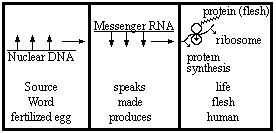
| |  |
| | He Spoke And It Was (Sidebar 2) The Process of Creation Speaking Things Into Existence God is a spirit and as such, is in a realm of speculation for man. Most likely, the fabric of the spirit world is unknowable. Since God is not part of His created universe, matter (energy), space and time may not be constituents of His heaven. So, what is the makeup of spiritual things (God, angels, demons and celestial cities)? Theologians have tried to imagine all kinds of constructs that might explain that domain. About all that might be suggested is that the spirit world is the residence of ideas, essences, and possibilities; it is a source for elements of heaven and the universe. All of which is to simply plead ignorance of this matter. Having done poorly on explaining heaven, is there hope that the interface between heaven and the creation could be any better understood? I think so. This interface is a zone of transfer of information between the terrestrial and the sublime. More simply, it is a transition bridged by two-way communication. God talks to His creation and man responds in prayer and meditation. Are there models for this communication? Two examples come to mind: Genesis 1 and John 1. These are narratives in which God explains how He created the universe and then Jesus Christ the man, respectively. For some time creationists have disclaimed to know how God created things (i.e. the laws and processes by which He formed the physical and biological worlds). The laws and processes of creation would seem to be just the reverse of today's law of decay. What formula does God use in these Scriptures? In both cases God speaks and it is so. A source (God in heaven) speaks and the words become reality within the creation. source Likewise, in Gen. 1:6, 9, 11, 14, 20, 24, 26, and 2:18 God spoke and it was accomplished.
John 1 is not direct narrative but certainly conveys a similar process.
Once again the source is God who is indistinguishable from the Word (Jesus Christ). They were preexistent. Then the Word makes everything. Notice now that
This is extremely effective communication! Is there an illustration of this principle in the created world? There is. John goes on to say, Jn. 1:14 "And the Word was made flesh, and dwelt among us, (and we beheld His glory, the glory as of the only begotten of the Father,) full of grace and truth." In verses 4 and 5 John tells us further that, "In Him was life; and the life was the light of men. And the light shineth in darkness; and the darkness comprehended it not." Life is just such a process in which there is a fundamental message, the genes on each cell's nuclear chromosomes, which are transcribed in bits and then decoded by ribosomes and translated into protein products (enzymes, building blocks, receptors, etc.). This process is the basic mechanism of forming living systems (everything biological). A formula can now be suggested in parallel with the former discussion.  Now let us turn our attention to the non-living part of the creation. Peter affirms that the Word was instrumental in the formation of the heavens and earth as well as its upkeep.
Once again God uses his Word to create the lithosphere and atmosphere. When man affects his surroundings, it is a result of two basic acts, contracting muscles or secreting glands. Even singing is the result of pushing air through vocal cords and modulating the sound of the muscular tongue and lips. Yes, a lot of work is done by machines. But these were first made by moving muscles. Even invalid use of computers can be traced to movement of the eyes in extreme cases for the operation of motorized carts and the like. Secretions get work done by causing: 1) enzymes to break down food, 2) sweating to regulate heat exchange, 3) oil to lubricate skin and hair, and 4) tears to wash the face of the eye, with the help of the eyelid, and the like. It is impressive to realize how man has influenced his world by these two processes. God, on the other hand, seems to be able to will speech into existence and transform these words into results through the agency of Jesus Christ and The Holy Spirit. They are the means of making and sustaining the creation. | |||||||||||||||||||||
| | | Summary & Review | Practice Examination | Sitemap | | Advanced Creationism Home | Biblical Creationism Home| Copyright © 1999 Institute for Creation Research |